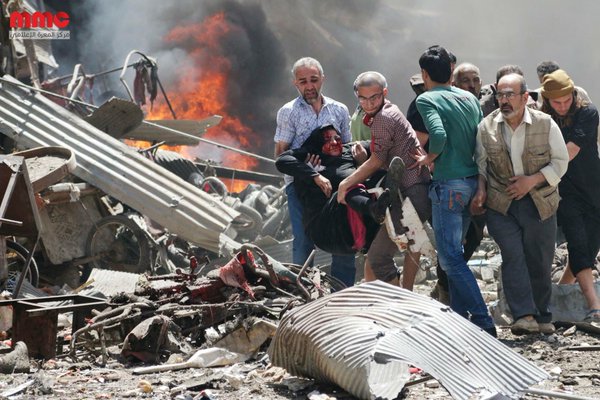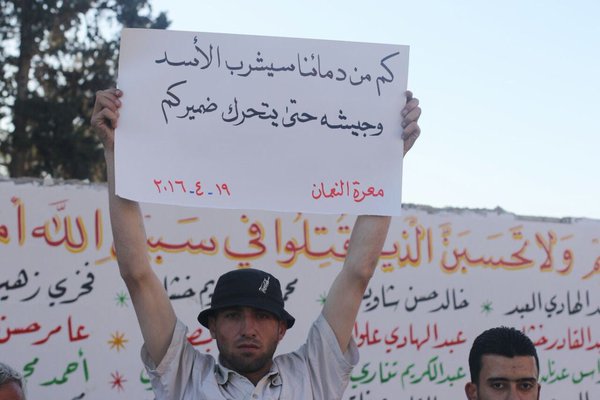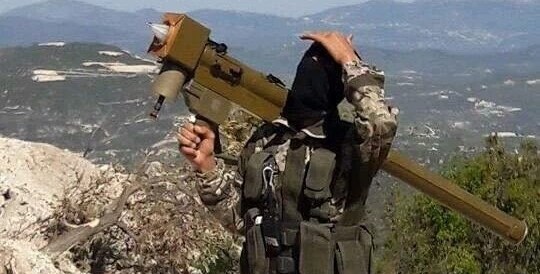PHOTO: Rebel with a MANPADS anti-air weapon in Latakia Province
LATEST
- New Opposition Political Group Announces Military Advance in Eastern Syria
- Video: The Barrel-Bombing of Besieged Darayya
- Video: Regime Attacks on Deir as-Safir Near Damascus
- “Intimidation” by Islamist Women’s Police in Idlib City
UPDATE 1700 GMT: The coordinator of the opposition-rebel High Negotiations Committee, Riad Hijab, has announced the formal suspension of the bloc’s involvement in talks.
Hijab asserted, “There can be no solution in Syria but to drop Bashar al-Assad”, bringing in a transitional governing authority with full executive powers. He called on UN envoy Staffan de Mistura to produce a timetable for that outcome.
The former Syrian Prime Minister also cited the Assad regime’s continued blocking of humanitarian aid to besieged areas, and the detention of thousands of people, including women and children.
“The truce agreement has vanished in light of the continuation of breaches by al-Assad’s forces. Iran still sends its troops and Russia continues its bombardment.”
Hijab called for the support of Syria’s rebels with weapons, advising them to continue their fight until the fall of Assad.
The HNC’s lead negotiator, Mohammad Alloush, said he is leaving Geneva because he does not want to be part of an “absurd” political solution that brings no lasting resolution.
UPDATE 1100 GMT: Regime warplanes have carried out airstrikes in two areas of opposition-held Idlib Province, killing at least 48 people and wounding scores.
Aftermath of an attack on Kafranbel, killing 10 people (Warning — Graphic Images):
18+
Graphic image of the first moments after regime warplanes struck open marketplace full of civilians in Kafranbel pic.twitter.com/TTuiHXZQ94— هادي العبدالله Hadi (@HadiAlabdallah) April 19, 2016
An injured woman is carried from a destroyed vegetable market in Maarat al-Num’anw, where 38 people died:

The remains of the market:
A protester in the province holds up a sign, “How much of our blood will Assad and his army drink until he moves your conscience?”

ORIGINAL ENTRY: As Syria’s political talks neared breakdown in Geneva on Monday, rebels and jihadists launched offensives in two more provinces against the Assad regime and its foreign allies.
Rebels, Jabhat al-Nusra, and Jund al-Aqsa attacked in northern Latakia Province on the Mediterranean and in neighboring Hama Province in the al-Ghab Plain, which has been disputed since rebels claimed much of northwest Syria last spring.
Announcing a joint operations room for the offensives, rebels said they were responding to breaches of the ceasefire by regime forces, including targeting of camps for displaced Syrians and shelling of residential areas. Factions included in the operations room include Ahrar al-Sham, Jaish al-Islam, and the Sham Legion.
Pro-opposition activists reported initial gains in both provinces.
In Latakia, the offensive closed on Kinsibba, which had been taken by the Syrian military in February. In the al-Ghab Plain, Jund al-Aqsa and rebels moved into Khirbet al-Naqous, but there were disputed claims over whether an attack captured Hakoura.
A pro-regime site said that the Syrian military cancelled further operations against the Islamic State in central Syria to move troops to the Latakia and Hama fronts. The regime forces had planned to advance along the highway from Palmyra in Homs Province, captured last month, to areas of Deir ez-Zor Province.
Earlier this month, rebels and Jabhat al-Nusra began the pushback against regime-Russian-Iranian-Hezbollah offensives from last autumn. They regained some areas south of Aleppo city, including the town of al-Eis on the Aleppo-to-Damascus highway.
Overlooking the battle in the northern al-Ghab Plain:
Opposition Formally Leaves Geneva Talks
Meanwhile, the opposition-rebel High Negotiations Committee suspended formal participation in the Geneva talks, which had resumed last Wednesday, although it is remaining for informal discussions.
See Syria Developing: Opposition-Bloc Rebel Suspends Formal Involvement in Talks
The opposition-rebel coordinator, Riad Hijab, said that it was unacceptable for talks to continue if the regime and its foreign allies maintained sieges and bombing of civilian areas. A letter by rebel factions called on the bloc to “take firm and decisive stances towards the half-solutions being propagated…by the regime’s allies…and [UN envoy Staffan] de Mistura”.
President Assad and the regime delegation have said that they will not discuss a transitional governing authority, the centerpiece of international proposals since June 2012. The regime has also maintained sieges on several areas on Syria, refusing access to aid agencies despite a UN Security Council resolution and the terms of a February 27 cessation of hostilities.
Mohammad Alloush, a senior negotiator for the HNC, said:
We want real negotiations, not farcical ones.
When there are 70 airstrikes, and when there is mobilizing of troops, when Iran sends further armed men and Russia sends a large group of rockets and unmanned planes, all this tells us that there is no real will for a political solution that ensures the safety and stability in the country.
UN envoy de Mistura responded:
It is one way for them to display their displeasure and concern for what they perceive to be a substantial deterioration of the humanitarian situation and a deterioration of the security environment, particularly in Aleppo.
They told us however their intention to remain in Geneva, in their hotel, and possibly at my own suggestion, to pursue technical discussions with myself and my team.
Obama “Intense Conversation” with Putin
The White House said President Obama had “an intense conversation” with Vladimir Putin, urging the Russian leader to use his influence with President Assad to stop attacks against rebels.
A statement released by Putin’s office said he had stressed the need for opposition leaders in Syria to distance themselves from the Islamic State and Jabhat al-Nusra.
New Opposition Political Group Announces Military Advance in Eastern Syria
A new opposition group, Ghad al-Souri (Syria’s Tomorrow), has announced advances by its armed branch in eastern Syria.
The group, led by former Syrian National Coalition head Ahmed al-Jarba, said its fighters had taken control of villages and areas in Hasakah and Deir-ez-Zor Province. A spokesman for the “Syrian Elite” forces declared a campaign for “the cohesion of the Arab-Kurdish fabric” and the “unity of Syrian land” with a “belief in democracy and pluralism”.
Ghad al-Souri appears to linked to the Kurdish-led, US-backed Syrian Democratic Forces. The SDF was formed last autumn and has pushed back the Islamic State in northeastern Syria. It is now moving west of the Euphrates River, despite the concerns of Turkey and Syrian rebels.
The movement held its initial meeting in Cairo last month.
Video: The Barrel-Bombing of Besieged Darayya
Amnesty International circulates video of the barrel-bombing of the besieged town of Darayya, the town near Damascus which has been besieged since late 2012:
According to the local council, about 6,800 barrel bombs have been dropped on the town between January 2014 until February 26, 2016. At least 42 civilians, including 17 children, have been killed, while local activists said 1,200 people have been wounded.
Between 4,000 and 8,000 people remain in Darayya, suffering from lack of food and medicine because of the regime’s continued siege. A UN official visited the town last weekend and apologized for being “late” in a response, but there was no sign of any aid convoy.
See Syria Daily, April 18: The UN’s Empty Visit to Besieged Darayya
Video: Regime Attacks on Deir as-Safir Near Damascus
Aftermath of regime rocket and artillery attacks on Deir as-Safir, southeast of Damascus, on Monday:
A boy cries upon learning of the death of his mother:
A boy crying as his mother was killed in the massacre committed by #Assad artillery today in #Damascus countryside pic.twitter.com/BsS4rynuQv
— Orient News English (@OrientNewsEn) April 19, 2016
“Intimidation” by Islamist Women’s Police in Idlib City
A resident of Idlib city, controlled by the opposition since last spring, has spoken of intimidation by a women’s police force enforcing codes on clothing, including the wearing of headscarves.
Umm Khaled, a 35-year-old mother of two, said the individual units had “limited impact”: “I think the goal is simply to give the impression that you are being watched.”
However, she claimed that the “interference…has caused some young women to stop attending university”.
While saying that she supported Islamic dress, Umm Khaled said, “We no longer have personal freedoms. Clothing is about personal freedom and I don’t want to feel that I’m being imposed upon.”

